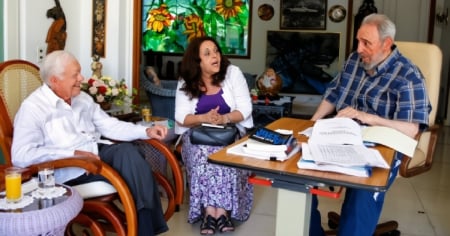Lisset Fonseca, mother of the 11J protester Roberto Pérez Fonseca, called for the release of Cuban political prisoners in a message marking the first day of the new year.
"Freedom for my son, freedom for all political prisoners," expressed in a message posted on X by his other son, the activist Albert Fonseca.
He remembered that his son, Roberto Pérez Fonseca, was one of the thousands of Cubans who joined the historic uprising on July 11, 2021, and was later sentenced to 10 years in prison for breaking an image of Fidel Castro during the protests in San José de las Lajas.
His case is just one of many examples of repression on the island, where Cuban authorities have severely punished over 700 protesters from that day.
In his New Year's message, Albert Fonseca also remembered his brother Roberto and the hardships he has had to endure in prison, where he has faced cruel and inhumane treatment.
The Fonseca family has been a symbol of resilience since July 11 in the fight for the release of Roberto and the other political prisoners.
In August 2022, Lisset Fonseca was arrested by the Cuban police while peacefully protesting alongside other relatives of political prisoners in the Plaza de la Catedral in Havana.
That same year, the mother was prevented from traveling to Europe, where she was scheduled to meet with international organizations such as the European Parliament and the United Nations Human Rights Committee to advocate for the freedom of her son and other political prisoners.
Frequently Asked Questions about Cuban Political Prisoners and the July 11 Protests
Who is Roberto Pérez Fonseca and why is he in prison?
Roberto Pérez Fonseca is a protester from July 11, 2021, in Cuba, who was sentenced to 10 years in prison for breaking an image of Fidel Castro during the protests in San José de las Lajas. His case is emblematic of the repression by the Cuban regime against those who took part in these historic demonstrations in pursuit of freedom and human rights.
How many 11J protesters are still in prison in Cuba?
According to reports from independent organizations, 554 protesters from the 11J demonstrations remain imprisoned in Cuba. These individuals were arrested during the massive protests in July 2021 and face sentences of up to 20 years in prison, highlighting the severe repression of the Cuban regime.
How has the international community reacted to the situation of political prisoners in Cuba?
The international community has expressed concern and condemned the human rights violations in Cuba. Organizations such as Amnesty International have designated several protesters as prisoners of conscience, demanding their immediate and unconditional release. However, concrete actions to pressure the Cuban regime have been limited, which has drawn criticism from activists and human rights defenders.
What conditions do political prisoners face in Cuban jails?
Political prisoners in Cuba face extremely harsh and inhumane conditions. Reports have documented torture, medical negligence, and cruel and inhumane treatment. These conditions have led to a deplorable state of health for many detainees, and in some cases, have resulted in deaths in custody, reflecting the systematic abuse by the Cuban regime.
Filed under:
